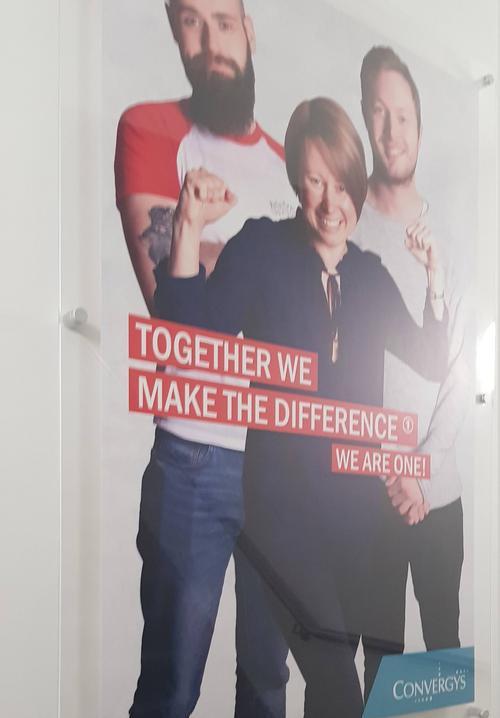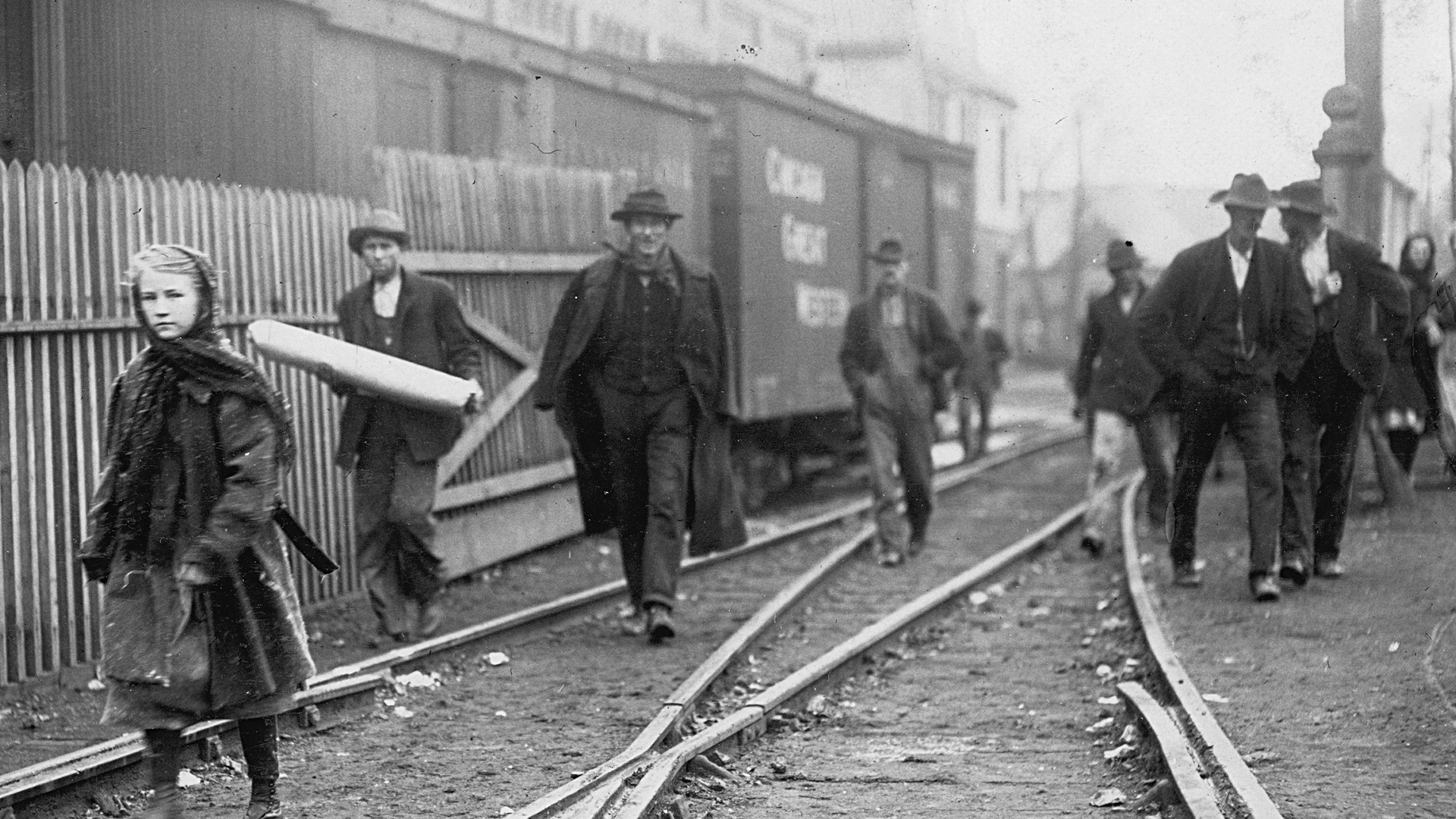Breaking the Cycle: An Inquiry on Customer Service in Platform Capitalism
by
Bob Elliott
February 14, 2019
Featured in The Call Centre Seen from Below (#6)
Call centres have become an almost ubiquitous feature of contemporary supply chains, facilitating the circulation of capital through telesales, customer service, technical support and a variety of other means.

inquiry
Breaking the Cycle: An Inquiry on Customer Service in Platform Capitalism
by
Bob Elliott
/
Feb. 14, 2019
in
The Call Centre Seen from Below
(#6)
Call centres have become an almost ubiquitous feature of contemporary supply chains, facilitating the circulation of capital through telesales, customer service, technical support and a variety of other means.
Call centres have become an almost ubiquitous feature of contemporary supply chains, facilitating the circulation of capital through telesales, customer service, technical support and a variety of other means. They are currently a significant source of employment and, subsequently, a key battleground in class struggle.
Drawing on the tradition of workers’ inquiry, I wanted to provide an account of my own experience in a customer service call centre. Notes from Below, which provided the opportunity for this, is a project with the potential to become a base for sharing and co-ordinating similar inquiries, experiences, ideas and strategies for change.
This is written under a pseudonym because of my position as a precarious worker in a cycle of call centre work.
If you search for job vacancies in the North East of England, you find an endless list of outsourcing call centres with generic names like Teleperformance, Sitel, Parseq and Manpower, as well as in-house call centres for communication companies like EE, Sky, BT, and huge public sector ones like the Department of Work and Pensions (DWP) and HM Revenue and Customs (HMRC).
These make up a vast network of call centres in the area - a circuit of workplaces, where people survive by finding work in one, staying for a few months, becoming exhausted, bored, or getting sacked, then moving on to another. Locally, this is sometimes called ‘doing the rounds’ or ‘doing your time’. It is hugely common and hugely discouraged as something to avoid at all costs.
After nearly six months of being unemployed while Universal Credit1 was being rolled out in the region, I found myself with no choice but to take up work in one of these places - Convergys, now called Concentrix after a merger - starting my own time stuck in the circuit.
Call centres have existed for a long time, but their current position as a major source of employment can only be fully understood by looking at the history of platform capitalism: the emergence and proliferation of companies who provide a base for other businesses to operate from, facilitating interactions between providers and consumers. Despite relying heavily on mass customer engagement, customer service is usually an inconvenient afterthought in the platform model, which is where outsourcing comes in. Combine this with the circumstances which Jamie Woodcock identifies as reasons for the explosive growth of call centre work in recent years - de-regulation by the state, the introduction of new technologies for controlling workers, the weaponization of affective labour at work, and the decline of unions2 - and you get the perfect storm for a huge number of exploitative, precarious and dead-end workplaces.
When you call almost any large business, it’s likely that you’ll speak to an outsourced worker in a place like Convergys. The local branch hired workers to answer calls for at least ten well-known companies, one of the largest of which was the major international payment processor PayPal. This is where I ended up, on an outsourced ‘campaign’ with a workforce of around two hundred in Newcastle, although the workers changed regularly with the huge turnover of staff. We were part of what has been called the ‘shadow workforce’ of wealthy tech companies - contracted to work for them, but without the benefits, pay and conditions afforded to their in-house core of Silicon Valley staff.
Huge sections of the working class are located in these kinds of workplaces, with over one million people employed in call centres in the UK alone. These act as testing grounds for new technologies and changing styles of management. Understanding them is necessary for understanding the nature of contemporary capitalism and the challenges and opportunities facing our class today.
This is what I want to do here, documenting my experience at Convergys as an example of work in the North East circuit and in customer service call centres more broadly, contributing to a public knowledge of working conditions in call centres which can be drawn on in future workers’ struggles. As soon as I started the job, I set out to understand the company, to identify the contradictions and tensions in how the workplace is run and to use this knowledge to fight for better conditions, build a union and bring other workers together to resist the misery of these places - disrupting the cycle of precarious work and demonstrating that something better is possible, inspired by the militancy of other service sector workers.
Class composition analysis provides workers with a framework for inquiries. After introducing PayPal’s history as context for my inquiry, I look at the social composition of the workforce, at the technical composition of the workplace itself, and finally at the resulting political composition of workers, at both our successful and failed attempts at resistance, concluding by proposing some potential strategies for action.
PayPal: a platform at war
Unlike Google, Facebook, Amazon and others, there is little analysis of PayPal as a feature of platform capitalism, yet it fits the definition perfectly. It acts as a facilitator in the circulation of capital, moving money between customers and other companies, whilst extracting profit from these transactions for itself by charging fees. Businesses and customers come to rely on it as its monopoly on online person-to-person and auction payments increases and as spreads to the fields of card-processing machines and credit.
As Nick Srnicek points out, the platform model is not particularly new.3 PayPal takes up the age-old role of the middle man, jacking up prices for buyers. What is new is the gathering and utilisation of huge quantities of customer data. Each PayPal account is classified according to its engagement with the service and whether it belongs to a buyer or a seller. The treatment of the person calling the company depends on this, with those accounts which sell most having access to a special business support phone line as they are the primary source of PayPal’s profit.
In his account of PayPal’s history, former vice president of marketing Eric M. Jackson paints the company as a benevolent libertarian presence in the global economy, taking power over wealth away from states and banks and giving it to individuals.4 It survived the dot-com crash, overpowered competitors in its ‘war’ for monopoly and provided a starting ground for some of capitalism’s modern-day feudal barons, including Elon Musk and Peter Thiel. Its measure of success has always been the number accounts opened, with its founders counting each new one in its earlier years on their ‘world domination index’ - currently standing at over 250 million.
Despite this reliance on customer engagement, customer service has always been an inconvenient necessity for the company. Jackson’s account tells us that it was barely considered until PayPal faced a communications crisis as the company expanded. Web farms in Asia and outsourcing were both considered as solutions to this before deciding to open an in-house call centre in Omaha, boosting PayPal’s public image by providing jobs outside of the Silicon Valley bubble. This charitable myth is still used today, with Convergys advertising that it locates its call centres in deprived areas - the second Convergys call centre that serves PayPal’s UK customers is in Manila - claiming that it does so to create jobs, whilst conveniently drawing on vast ready-made reserve armies of labour.
In this context, a sense of prestige was encouraged amongst workers that we were the first point of contact for such an innovative, famous and successful business venture which had overcome its challenges and competitors through struggle. The reality of outsourced work was far less glamorous.
Social composition: just passing through
Like most other North East call centres, Convergys is based in a purpose-built business park on the outskirts of Newcastle: Quorum Business Park.
Quorum can be called a ‘non-place’: somewhere made for passing through, that looks like more of a commuter hub than a workplace, where people in it feel anonymous and insignificant.5 It’s somewhere that seems like it was designed and built with an implicit awareness of its own impermanence and an unspoken admission that its sterile, plywood-like buildings will eventually come to resemble the rotting, abandoned factories of the last century, before being demolished to make way for whatever industry takes their place. This points to an underinvestment in constant capital and a view of the the workforce as temporary, easily-moved and disposable. The hundreds of outsourced jobs there are permanently precarious, always under threat of being outsourced again, being scrapped when savings are needed or going under come the next financial downturn.
Convergys’ office has about 600 workers on a variety of outsourced campaigns, though the turnover of staff there is huge. On the PayPal campaign alone it was rumoured that over 1,200 workers had come and gone in the roughly seven years that it’s been there. Each outsourced section is divided by floor and separated from each other by a system of security cards, with socialising between workers only possible in the small and overcrowded smoking area and canteen during breaks. When you arrive, you pass promotional posters with clunky and meaningless slogans like: ‘Together we make the difference!’ and ‘Our values one set to achieve our goals!’. Groups of up to 25 new starters are trained in monthly ‘waves’, in a week-long programme that starts with a recording of CEO Andrea Ayres welcoming you to the ‘family’ from sunny California and continues with presentations on PayPal and occasional interactive games before you are marched onto the call floor.



What is most striking about the workforce is that it is almost entirely well-educated, white and under 25. Around half of us had degrees, many in practical subjects that were expected to lead to a career afterwards, like business, psychology, even law. The reality for working class students was that these had not led to careers. People would end up in debt, pushed out of the housing market, moving back in with their parents, and having no choice but to enter the call centre circuit. It was treated as a stopgap but workers would often end up stuck in it for years.
While some campaigns involved answering international calls and required workers who could speak multiple languages, the PayPal campaign was English-only and encouraged people with friendly Geordie accents6 to apply - in other words, people who aren’t foreign. We were assured that we would definitely pass our probationary period because most of those who did not only spoke English as a second language. Alongside this, the racist attitudes and abuse from customers made it worse to work there if you were not white and English. Aside from the casual comments like ‘Thank God I’m speaking to someone English’, there were cases where colleagues were called ‘monkey’ and ‘n****r’ and no repercussions could be taken against the customer. You could try and pass it to a manager if one was available, but we were always reminded that hanging up on any customer, no matter how abusive, was a sackable offence.
The majority of older workers who entered the workplace - many of whom had union membership from previous jobs - seemed to leave after the first week. When I mentioned this to people, it was usually blamed on the attitude of young workers. We were ‘lazy, juvenile and made a mockery of the workplace’, a manager told me. Older, more experienced workers would not put up with it. In reality, the young people I met there were intelligent, dedicated and hard-working, with some genuinely interested in the technical side of PayPal, albeit pissed off in the knowledge that things should be better than this. The real reason for the age issue was that if someone had experienced unionised workplaces with much better conditions, as a lot of older workers had, they were not likely to stick around in this place.
There was an underlying anger, tension and sense of unfairness as a result of this social composition at the company, but solid structural barriers stood in the way of mobilising that for resistance.
Technical composition: the ‘paradigmatic labourer’
The late Mark Fisher wrote that in hyper-communicative, digital capitalism, ‘[t]he paradigmatic labourer is now the call centre worker – the banal cyborg, punished whenever they unplug from the communicative matrix’.7 This rings true for Convergys, where constant surveillance was part of everyday life. As in other call centres, every call is recorded and random ones are selected to judge quality. The worker is made to evaluate their own calls and even those of colleagues, which are played out loud in team meetings. Should the company need to sack a worker for any reason, these recordings could be scoured for mistakes. Breaks and lunches are monitored to the second, as is everything you do in the call centre; if you go over your ten minutes weekly allowance for ‘unscheduled breaks’ (mostly used to go to the toilet) your pay is docked and your risk disciplinary action. When you click to go ‘ready’ at the start of a shift, the sense of disempowerment is overwhelming. From that point on, there’s no way of choosing not to take calls; they pour in endlessly and are worse on busier days when customers are more irate (and potentially abusive) due to longer waiting times. This creates an atmosphere of absolute powerlessness for the worker.
All of this is in service of targets set by PayPal themselves. Bonuses were promised if we met these targets based on how quickly we could handle the call, surveys customers received after calling, our hold time, how many calls we transferred to other departments, how little time we could spend working on an issue or writing emails after a call and other measures. These bonuses were meant to boost the pitiful wage to almost-liveable levels, but they would often prove contradictory and impossible to achieve. For example, if you spent more time talking to a customer or working on their issue after they’d hung up, their experience of PayPal might improve, but your call-handling time and aftercall work would shoot up. If the systems for managing accounts crashed (as they often did) you had to continue taking calls and trying to reach targets, even though there was absolutely nothing you could do to solve the caller’s problem. The company were willing to go to such lengths to eradicate any potential for workers to rest and recover between calls that they were willing to make PayPal look worse in the eyes of customers, which is supposedly a cardinal sin in customer service.
The real, most significant bonuses were paid by PayPal to Convergys itself based on how good the workforce was at meeting targets. This was where we, as customer service workers, were producing surplus value: by bringing in profit for Convergys whilst they ensured savings for PayPal.
At first glance this kind of inbound customer service work might appear economically unproductive - it doesn’t directly produce profit for PayPal but instead helps ensure that the actual production of surplus value goes smoothly, in this case by making sure that ever-increasing numbers of people use the service and that fees are charged successfully on their transactions. The economist Fiona Tregenna identifies this as ‘circulatory’ work 8. It can be deeply disempowering for customer service workers, who might be faced with no clear production line to disrupt through work stoppages or strike action - particularly in digital services like PayPal’s, where profit is largely produced through online interactions.
Despite this apparent circulatory nature of our work, PayPal never seemed particularly worried about the experiences of individual customers. Instead our focus was on dealing with the huge number of customer queries which resulted from PayPal’s monopoly status. We were taught that our job was not to sell PayPal to customers, but to get them off the phone quickly. This was, after all, how Convergys met PayPal’s targets and profited; this was what made our work productive. As a result of the outsourcing dynamic workers had a huge amount of power which we otherwise might not have - we were a vital part of a production process which could be disrupted if we stopped working, causing significant damage to our employers’ ability to profit. But that power only ever seemed to be potential, with countless measures in place to prevent it from ever being realised, going beyond draconian surveillance.
There was no shortage of hierarchy in the office, yet there was a sense of mystery about who was in charge. We had team leaders, ‘Senior Team Members’ who gave advice and took escalated calls, ‘Quality Control’ who listened to our calls, even floor managers who were responsible for the campaign overall, but there was always an obscurity around who exactly was ‘the boss’ - who you complained to when you had a problem, who you could direct your anger towards, and who exactly had the power to fire workers. This created divisions between workers whilst simultaneously portraying everyone as being in the same boat. It made resistance more difficult - you would feel guilty for complaining or for making more work for a colleague who, like ourselves when we took complaints from callers, usually did not have the power to do anything anyway.
In theory there was something called the Employee Council which was meant to fill the hole left by union absence, but in practice it only served the company, rewarding people for sticking to their schedules and bringing in bonuses. They did nothing about issues like accusations of bullying by management or about health and safety concerns, like the disappearance of the only source of clean water on the whole floor at the start of summer’s heatwave, or the fact that workers were afraid to drink water anyway and risk losing pay for going to the toilet. Issues of actual relevance to workers didn’t seem to be their remit.
In a similar token gesture, posters about mental health awareness were plastered everywhere in a bid to create the sense that Convergys cared for its employees. In reality there was no need to remind most us about mental health issues. Every second of ‘unauthorised absence’ had to be justified in detailed written reports to HR. Shift patterns and booked holidays were regularly messed up by the algorithm that decided our hours. We had no option of hanging up on abusive customers who would often come up with creative death threats like ‘I’m going to hunt you down like a rabid dog’ when we couldn’t solve their problem.
On top of this, there was the stress caused by the constant restructuring of departments and changes in technology which came from in-house management without ever informing outsourced workers. This created a constant atmosphere of uncertainty and urgency, where little time could be found to complain or organise for change. You could come in one morning to be told that you were going to be trained on a totally different skill set without being consulted, or sit down to take a call and find that the layout of the entire system had changed without warning. Like other newer and changing aspects of PayPal, Money Pools - a feature that is being widely promoted at the moment - were something we had no training on and that no one seemed to understand. Instead, workers had to try and learn about these by taking difficult calls, or else lie to the customer to get rid of them.
We were told not to worry about our conditions and the stress they caused because things in other call centres were worse. Unlike other local call centres, ours didn’t require memorising scripts - colleagues who had worked in these places told me that they would often find themselves reciting the script in their sleep. We had working air conditioning, whilst the rival Parseq call centre was known for being like a sauna. And at least we weren’t at Convergys’ Manilla call centre, where our equivalents were ‘worth’ a third of what we were paid despite doing the exact same work, where they answered calls through the night to reflect UK opening times, and where it was rumoured that suicide nets were strung from every floor. These constant comparisons to other workplaces and workforces were deployed as a means of trying to decrease staff turnover, reminding workers that things could always be worse for us.
Other divisions were used similarly as a means of control. Not only were we pitted against workers in other call centres in stories about who had the best conditions, but also against each other for bonuses and against the customers who we had to take countless calls from as quickly as possible, who became a product to be rushed off the production line. The reality was that there were always shared interests between us. For example, most of us had PayPal accounts and there were always jokes about how we hoped that nothing would go wrong so that we wouldn’t have to call this place. These were indicative of a deeper point about our dual-position as both the public face of a service and as users of that same service. It was in our interest that things should go more smoothly, both to make our working day easier and to improve our own experiences and sense of financial security when using PayPal. PayPal’s monopoly status and use of the outsourcing model - and resulting need to prioritise meeting targets over all else - stood in the way of providing the efficient service that PayPal promised. Ours was supposedly one of the best of Convergys’ global call centres at bringing in profit and was subsequently an outstanding example of the inefficiencies of outsourcing.
To cut costs, we relied on glitchy tech that would always crash and outsourced security systems to even less reliable companies. Instead of transferring calls to in-house departments, we would give out phone numbers for customers to ring, making them spend more time on the phone but reducing our rate of transferred calls. The communication between ourselves and these departments was virtually non-existent, causing many customers to end up trapped in a back-and-forth between us, with no one having enough knowledge to help them. We would be trained to give one piece of information, when a department elsewhere would say something totally different, as with the often-asked question of whether PayPal earns interest on funds held in people’s accounts (we were taught to insist that it does not, when the legal department would probably say otherwise).
Vulnerable customers were seen as burdens, people who would take up too much of our time, who we needed to ‘get off the phone’ by deploying a kind of fake empathy, or by convincing them that they had caused their own problems, deflecting any blame from PayPal themselves. This rush to get rid of such customers would usually backfire, with the same people calling back constantly because they couldn’t understand the problems they were having.
Alongside the myth of capitalist efficiency, my experience at Convergys challenged PayPal’s own mythical view of itself as a democratising force in the global economy. No matter where in the world PayPal operates, it adheres strictly to the US state’s rules and does what it can to further American imperialism. The most memorable cases I saw of this included a British customer who tried to buy a Cuban shirt using PayPal and had his account suspended pending investigation into whether he had breached US sanctions and an Iranian refugee who called in tears because we had threatened to shut down her account for buying products related to Iran. Efforts at fundraising for socialist causes through PayPal are regularly shut down. On this point, the workplace seemed to mirror PayPal’s globally anti-democratic nature.
When you meet these kinds of working conditions on a daily basis, they can feel like hopeless dead-ends that grind down any sense of dignity or ambition for change amongst workers; but stepping back and taking a broader view, this is exactly where resistance can take place and proliferate.
Political composition: what’s a union?
For most of the workers I met at Convergys, politics was something that happened outside the workplace. People were politicised. There was broad support for Corbyn’s Labour, a general opposition to Brexit, and an avowed anti-fascism which grew stronger as Tommy Robinson’s public profile increased.8 For example, I received more support than I had expected after trying to find and shut down Tommy Robinson’s PayPal account when it was looking like the company was not going to relent to public pressure to do so.
Despite this, most workers tended to leave their politics outside when they stepped into the call centre. There was no union presence and most people I spoke to either did not know what unions were or only had vague ideas about them. Management did not have to bother discouraging people from joining unions - they could get by pretending that they didn’t exist.
At the same time, there was a lot of what Jamie Woodcock identifies as ‘informal’ resistance, or the refusal of work: actions which oppose or refuse bad working conditions, but which take place outside of the organised frameworks of ‘formal’ resistance such as unions or traditional strike action. People would always find ways of sabotaging phone lines, stretching out team meetings or evaluations for more time off the phones, pulling sickies, and carving out time for rest when it was denied to us.
When I first started the job, I did not think that this kind of unorganised resistance, with its lack of ambition for substantial change, was good enough. Informal action achieved small victories throughout the day, but I wanted the ability to collectively voice our grievances, make demands and win long-term change through a union.
The first challenge for working towards this was actually deciding which union to join and to try and organise with. Almost every major multi-sector union has claimed to be the union for call centre workers, but without much to show for it. Unite had a large and active local membership, but minimal presence in the call centre circuit. The GMB had done good work previously in the notorious Parseq call centre but seemed to have gone quiet since then. The Communication Workers Union (CWU) had worked with Convergys’ workers locally and internationally and was running an ambitious drive for recognition at EE call centres, but was primarily known for being a union for postal workers.
There was also the Industrial Workers of the World (IWW). Like a lot of members, I had joined the IWW as a student because I admired its politics, rather than through a workplace. While I knew the union’s participatory model was probably the best for organising precarious workers, I struggled to imagine myself recruiting people with little background knowledge of its politics to an organisation which can sometimes feel like a historical re-enactment society, with an odd nostalgia for the era of long-dead American revolutionaries and their jargon, exemplified by the use of terms like ‘Wobblies’. There were also the off-putting remnants of the early 2000s anarchist scene hanging on to the edges of the union, espousing a kind of left-puritanism that, for me, culminated in the suggestion of a (former) local member that we should ban Labour Party members from joining. In retrospect, while I still think these criticisms of the IWW are valid and potentially stand in the way of the union’s growth, I should not have let them put me off as much as they did.
I ended up joining the CWU because of their track record. After pestering them for a few weeks, an organiser sent me union leaflets to distribute. Ultimately though, I found that the CWU was embedded in the ‘insurance salesman’ model of union organising, more focused on reactive protection than on fighting for change. They could be difficult to contact and never seemed to be open to suggestions about how to organise from workers themselves. I never learnt how the local branch functioned and was never put in touch with other call centre workers. They also never addressed the reasonable objections I kept coming across - that membership was too expensive, that people were never at the job long enough to benefit, and that team leaders at Convergys provided basically the same service for free, including accompanying workers to disciplinaries. Towards the end of my time there, I found out that a worker who was well-known for grassing up others to get ahead was a long-term union member, personifying the downsides of the union-as-insurance model.
I did what I could and managed to recruit a small group of people, though mainly those who were friends or whose jobs were under threat. I tried to encourage discussion of shared grievances and slowly introduce the idea of collective action and unionising as a way of addressing those. This took time; it was months before others started to take the idea of joining the union seriously. For many the monthly dues were simply unaffordable, other straightforwardly didn’t think that they would be at the company long enough to benefit. People were also unwilling to risk their jobs by taking action outside of the union, such as by trying to make complaints to management as a group. We all knew that, with every call recorded and poor training meaning that we often had to improvise calls, it would not be hard for management to find an excuse to fire anyone. Those who did join tended to do so when they perceived future disciplinary action against them and needed protection. There were never enough of us with enough confidence to take anything beyond defensive action.
Though this effort to formalise resistance did not achieve much, informal resistance proved more effective than I had assumed it could and instances of the refusal of work forced a number of significant changes in the call centre. Late shifts required staying behind after closing hours to clear the phone lines, stretching out the working day as much as possible. The flat-out refusal of people to do this made it untenable and forced the scrapping of the policy. The fact that workers kept quitting in huge numbers forced efforts to reduce the turnover, including a raise in wages (though this conveniently coincided with an increase in the minimum wage nationally). For unions to grow in workplaces like this, they have to learn to recognise this kind of refusal of work and consider ways of weaponizing it.
There also needs to be a greater effort to point out shared interests in workplaces that thrive on division and vague hierarchies. Everyone on the call centre floor was a worker, even if some became slightly closer to management by becoming team leaders. Though we never saw anyone who worked for PayPal in-house, there was a sense of mutual resentment and distrust when we occasionally had to call each other for advice. More departments were being outsourced to us, putting their jobs at risk, and there were always rumours about how much more than us they earned. Ultimately though, we were both being exploited by the same company. As Wendy Liu points out, an alliance between in-house and outsourced workers could present a powerful threat. Finally, there was the division between customer and worker, understandable considering the abuse we received and the financial problems PayPal could cause customers, but neglectful of the fact that we were both collateral damage in the same company’s attempt at ‘world domination’.
Each of these suggestions is easier said than done, but each is also being explored by radical developments in today’s workers’ movement. Examples include independent unions encouraging formal and informal refusal of work (including the IWW), in-house university staff fighting for rights for contracted workers, and whistleblowers in places like the Universal Credit call centre drawing public attention to the shared interests of service users and providers.
I left Convergys after eight months - much longer than most people stayed - disappointed that I hadn’t achieved the changes I had aimed for, taking up a job in another call centre instead. Things were getting unbearably worse, breaks were being monitored more closely, time off the phones was being cancelled to meet more stringent targets being set by PayPal, old and entrenched tech was being updated causing major disruption, and every second on the phones was being counted to squeeze out as much productivity as possible. The result of this growing pressure was an exodus of experienced workers to other call centres, though this had little impact as the next month’s wave of new employees were brought in.
The conditions of workers trapped in these cycles of precarious and disempowering work reflect the position of our class today, scraping by with little hope or ambition while capitalist order implodes around us and desperately tries to restructure itself. The major challenge we face is to disrupt these cycles, to find and draw out their contradictions and empower workers within them to struggle towards something better. In the hyper-surveilled and suffocating environment of call centres, inquiries can be a first step towards this, sharing ideas, analysis and strategies for change.
-
Universal Credit is a welfare reform in the UK. See: https://www.theguardian.com/society/2018/jan/25/universal-credit-benefits-scheme-iain-duncan-smith ↩
-
Woodcock, Jamie. (2017) Working the Phones: Control and Resistance in Call Centres. London: Pluto Press. ↩
-
Srnicek, Nick. (2017) Platform Capitalism. Cambridge: Polity Press. p.41 ↩
-
Jackson, Eric M. (2012) The PayPal Wars: Battles with Ebay, the Media, the Mafia, and the Rest of Planet Earth. Washington DC: WND Books. p.21 ↩
-
Augé, Marc. (2009) Non-places: Introduction to an Anthropology of Supermodernity. London: Verso. ↩
-
The distinctive Geordie dialect and accent is from the Tyneside area in the North East of England. ↩
-
Fisher, Mark. (2014) Ghosts of My Life: Writings on Depression, Hauntology and Lost Futures. London: Zero Books. P.174. ↩
-
Tregenna, Fiona. (2009) ‘Services’ in Marxian Economic Thought. Cambridge: Faculty of Economics, University of Cambridge ↩↩
-
Tommy Robinson is a far-right agitator in the UK. ↩
Featured in The Call Centre Seen from Below (#6)
author
Bob Elliott
Subscribe to Notes from Below
Subscribe now to Notes from Below, and get our print issues sent to your front door three times a year. For every subscriber, we’re also able to print a load of free copies to hand out in workplaces, neighbourhoods, prisons and picket lines. Can you subscribe now and support us in spreading Marxist ideas in the workplace?
Read next

Towards an Organized Tech Industry—Part One
by
Wendy Liu
/
July 15, 2018

